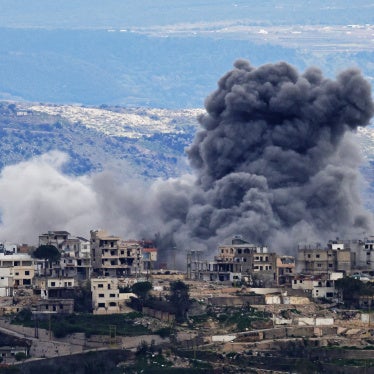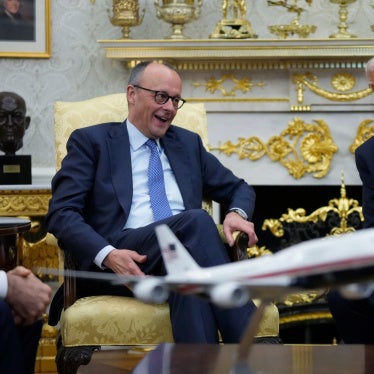The government uses the threat of terrorism and religious extremism as a pretext to crack down on peaceful dissent. There are continuous and credible reports of torture and ill-treatment being used to obtain statements from suspects in custody. Sentenced prisoners also face deliberate ill-treatment.
Human Rights Defenders
Authorities have refused to grant legal recognition to every truly independent human rights organization that has applied over the past decade. They then invoke the organization’s “illegal” status to hamper its activities. For example, on June 6, 2007, police encircled the Tunis office of the non-recognized National Council on Liberties in Tunisia and blocked entry to representatives of civil society who had come to show solidarity with the Council. Police also blocked meetings by the non-recognized International Association of Solidarity with Political Prisoners.
The independent Tunisian Human Rights League, a legally recognized group, continued to face lawsuits filed by dissident members. The broader context showed these supposedly private suits to be part of a larger pattern of repression: the courts ruled systematically in favor of the plaintiffs, providing a legal veneer for large-scale police operations to prevent most League meetings at its branches around the country.
Human rights defenders and dissidents are subject to heavy surveillance, arbitrary travel bans, dismissal from work, interruptions in phone service, physical assaults, harassment of relatives, suspicious acts of vandalism and theft, and slander campaigns in the press. On July 24, 2007 authorities freed on parole lawyer Mohamed Abbou, who had served two-thirds of a three-and-a-half year sentence that was imposed after he published harsh critiques of President Ben Ali in online forums. As of November 2007, authorities were refusing to let Abbou travel abroad. In June 2007 authorities arbitrarily extended by two years a five-year-old order banishing released political prisoner Abdallah Zouari to a remote region 500 kilometers from his family’s home in Tunis. Zouari is an outspoken government critic and human rights activist.
Recommendation: Authorities should cease the politically motivated withholding of legal recognition to human rights and other civil society organizations that are likely to be critical of government policies. They should, in keeping with the U.N. General Assembly’s Declaration on Human Rights Defenders, lift arbitrary travel restrictions and cease their harassment of persons who collect and disseminate information on Tunisia’s human rights record.
The Justice System
The judiciary lacks independence. Prosecutors and judges usually turn a blind eye to torture allegations, even when the subject of formal complaints submitted by lawyers. Trial judges convict defendants solely or predominantly on the basis of coerced confessions, or on the testimony of witnesses whom the defendant does not have the opportunity to confront in court.
The International Committee of the Red Cross continued its program of visiting Tunisian prisons. However, authorities refuse to allow access by independent human rights organizations. During 2007 prison authorities placed a small number of inmates in prolonged solitary confinement, an abusive practice that had reportedly stopped after the government pledged in 2005 to end it.
Detainees report a range of methods of torture and ill-treatment during police interrogation. Most common, according to human rights lawyers and organizations, are sleep deprivation; threats to rape the detainee or women family members; beatings, especially on the soles of the feet (falaka), using fists, kicks, and sometimes clubs or electric cables; and tying and suspending detainees from the ceiling or from a rod in the “roast chicken” (poulet rôti ) position.
Tunisia has ratified the Convention against Torture and enacted strong legislation defining and criminalizing acts of torture. However, despite the submission of formal complaints by lawyers on behalf of defendants in hundreds of cases in recent years, no case has come to public attention of a state agent being held accountable for torturing persons held for politically motivated offenses.
Recommendation: The Council should urge the government of Tunisia to aggressively investigate allegations of torture by police of suspects under interrogation and to hold perpetrators accountable, pursuant to its obligations under the Conventation against Torture.
Freedom of Expression and of Political Life
None of the domestic print and broadcast media offers critical coverage of government policies, apart from a few low-circulation magazines that are subject to occasional confiscation. Tunisia has privately-owned radio and television stations, but private ownership is not synonymous with editorial independence. The government blocks certain domestic and international political or human rights websites featuring critical coverage of Tunisia.
Authorities have refused to accredit the correspondent of the Arabic satellite television channel al-Jazeera, Lotfi Hajji. Plainclothes police prevented Hajji from attending several news events during 2007. Hajji is also president of the independent Tunisian Journalists Syndicate, which authorities have refused to legalize.
The government tolerates small opposition parties up to a point. On October 1, 2007, in a ruling that appeared politically motivated, a court in Tunis ordered the eviction of the Progressive Democratic Party’s weekly organ al-Mawkef from its premises of 13 years on the grounds that the party had been using the office as a headquarters, in violation of the lease. The PDP is one of the rare outspoken legal parties. Authorities denied any role in what they said was a private dispute. However, al-Mawkef was spared eviction after President Ben Ali reportedly urged the landlord to resolve the dispute, following one month of domestic and international protests in support of al-Mawkef.
Recommendation: The Council should urge the government of Tunisia to allow all independent media and journalists to operate freely, and cease blocking websites because they criticize government policies,
Counterterrorism Measures
Tunisian authorities claim that they have long been in the forefront of combating terrorism and extremism. The 2003 Law in Support of “International Efforts to Fight Terrorism and the Repression of Money-Laundering” contains a broad definition of terrorism. Its definition, like that found in the Penal Code, encompasses “acts of incitement to racial or religious hatred or fanaticism regardless of the means employed,” thereby leaving open the possibility of prosecuting political opinion or association as crimes of terrorism.
Since the law’s enactment, authorities have rounded up hundreds of youths in towns around the country and charged them under its provisions. The government never accused the majority of those whom it subsequently convicted of having planned or committed specific acts of violence; rather, it charged them with planning to join jihadist movements abroad or inciting others to join. Authorities routinely deprived suspects detained under this law of their rights. Many were held in pre-arraignment incommunicado police custody (garde à vue) beyond the legal limit of six days. The police subjected many to torture and other mistreatment. Investigating judges questioned many defendants without informing them of their right to a lawyer at this stage, and routinely ignored their requests for a medical examination to check for evidence of mistreatment.
Recommendation: In keeping with its obligations as a party to the International Covenant on Civil and Political Rights, amend the 2003 anti-terror law in order to modify those articles that threaten fundamental human rights, such as the right to freedom of expression. In addition, ensure thorough investigations into allegations of serious violations of the law in the treatment of pre-trial suspects, including allegations of torture and mistreatment and the holding of detainees in pre-trial custody longer than the maximum period provided by law.






